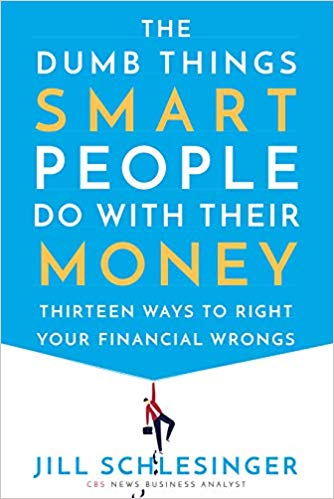by Carol H Cox

If you’ve ever listened to Jill Schlesinger’s podcast, you know that she’s a straight shooter, smart, and as to the point as you could wish for in a financial adviser. I really respect the woman and was excited to hear that she had a new book out, The Dumb Things Smart People Do With Their Money: Thirteen Ways to Right Your Financial Wrongs.
Because I love the way she banters on air and her manner of making me feel like she’s talking to me personally on her show, I decided to listen to the audiobook version, which she narrates herself. Great choice!
It’s an enjoyable, no holds barred dive into how not to make stupid mistakes with our money. If we’d only follow her advice, we’d no doubt be much better at such practices as investing using reason instead of emotion, avoiding obsessive emphasis on money, finding affordable ways to send kids to college, prioritizing retirement savings, and demystifying the allure of real estate, and so on.
In the audiobook, Jill works her way through the 13 wrong moves people make with their money, using personal anecdotes concerning her clients, friends, and family, and explains how we can avoid making them. Yes, we are not alone in screwing up our finances, others have made colossal errors just like we have. And Jill mentions quite a few of her own along the way.
One thread throughout the audiobook is how we often make poor choices because we allow ourselves to be driven by emotional and personality considerations. We’ve all fallen prey to a few of these:
- Fear: being afraid of looking dumb, so we avoid selling a poor investment
- Greed: trying to squeeze every last dollar out of an investment and then losing a huge chunk of money waiting to act
- Inattentiveness: selecting a financial advisor without finding out if they are a fiduciary and how they are compensated
- Guilt: sending offspring to a school we can’t afford because we think we owe it to them or prioritizing our child’s college preference over our retirement savings
- Lemming’s mentality: assuming buying real estate is always better than renting
- Denial: failing to have a will and other estate planning documents and not having life and disability insurance
- Over confidence: trying to time the market in our investing
These are just a few of the many ways we sabotage our financial well-being. Jill gives us good guidance on how we can combat these tendencies.
I like the fact that there are no charts or graphs required to understand the topics she covers. Jill has made the seemingly complicated simple. And she has made, what are often dry topics as entertaining as possible.
It’s one of the best personal finance books I’ve “read” and was well worth my time. I highly recommend the audiobook version.
